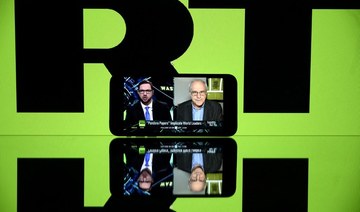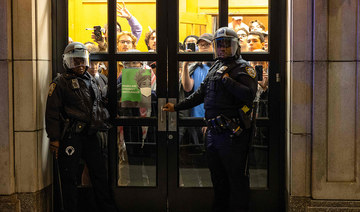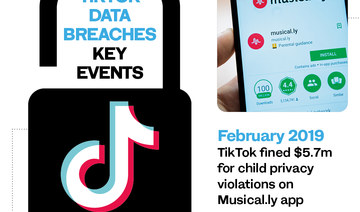NEW YORK: In a recent dispatch from Moscow, BBC correspondent Steve Rosenberg noted that a new Russian law required him to refer to the invasion of Ukraine as a “special military operation.”
Then he quoted a Russian human rights lawyer who liberally used what is now a forbidden word: “war.”
The restrictions on how news organizations can report in Russia, which carry punishment of up to 15 years in prison, have impeded journalists, but not muzzled them. Many continue to report aggressively, even from outside the country, by making use of modern tools unavailable a generation ago: the Internet, encrypted communications, mobile-phone cameras in the hands of millions — and simple bravery.
“I don’t think there’s any kind of lack of information about what is happening in Russia,” said Vasily Gatov, a Boston-based Russian media researcher whose mother still lives in Moscow.
The new law, abruptly put in place March 4, placed restrictions on use of the word “war” and threatens punishment for any stories that go against the Russian government’s version of events — what it refers to as “false information.” It immediately had a chilling effect for journalists serving audiences primarily in Russia, and it also forced those reporting to the outside world to reevaluate operations.
The BBC suspended its reporting from Russia for several days, but restored it on March 8. Some news organizations have pulled journalists out of the country, others have stripped bylines from stories. Concerned about safety, several news organizations have said little or nothing publicly about how their journalists are deployed.
Reporters who displeased authorities in the old Soviet Union could be expelled from the country. But a law that says they can be put in jail for 15 years is a different risk entirely, said Ann Cooper, who was an NPR bureau chief in Moscow and former executive director of the Committee to Protect Journalists.
“The change to the criminal code, which seems designed to turn any independent reporter into a criminal purely by association, makes it impossible to continue any semblance of normal journalism inside the country,” John Micklethwait, Bloomberg editor in chief, said in telling his staff that its reporters would be pulled from Russia.
Despite the exit, Bloomberg was credited with breaking significant news by reporting March 23 that Russian climate envoy Anatoly Chubais had stepped down and left the country. The story carried no dateline or byline, except a tag noting Simon Kennedy’s “assistance.”
The sentencing of Russian dissident Alexei Navalny to a longer stint in prison on March 22 tested how journalists could operate in a stricter environment.
Even though the decision was handed down at a penal colony 70 miles from from Moscow. The New York Times and The Washington Post both did thorough stories using a variety of sources: other news agencies, Twitter and Instagram posts, video of the hearing shown on YouTube, interviews with Navalny aides.
The Times had moved its staff out of Russia for safety reasons. The Moscow bureau chief, Anton Troianovski, is reporting from Istanbul, Turkey, and other journalists are scattered throughout Europe, said Jim Yardley, the Times’s Europe editor.
“We continue to cover Russia closely — monitoring Russian television, government briefings and social media, while staying in touch with and interviewing sources, experts, and Russians who are still inside the country,” Yardley said. “We hope that we can safely return to Moscow soon, but for now, we are working hard to cover the country from the outside.”
That’s where many of the new tools for keeping journalists informed come into play; Telegram is being used frequently for encrypted conversations, said Jeff Trimble, a lecturer at Ohio State University and a former Moscow reporter for US News & World Report. Plenty of video is available, but must be checked carefully for accuracy, he said.
The Associated Press wrote a story following Navalny’s sentencing about small signs of defiance emerging in Russia. It had a New York dateline and no byline, but no shortage of detail, including police in the city of Nizhny Novgorod detaining a silent demonstrator who displayed a blank sign.
The AP has written some unbylined stories with Moscow datelines and also broken news from outside sources, including a March 30 story about US intelligence sources saying that Russian President Vladimir Putin had been misled by his military aides about the war because of their fear of delivering bad news from the battlefield.
Julie Pace, the AP’s executive editor, said it’s vital to continue to report from countries around the world where press freedoms have been curtailed. Executives at competing news organizations are now engaging with each other about safety and security issues in Russia, she said.
Without the physical presence of reporters, it’s more difficult to keep track of how the war and economic sanctions are affecting day-to-day life in Russia. That makes Rosenberg’s BBC reports stand out: he visited a grocery store to see how purchase limits are in place to prevent hoarding, and interviewed an 88-year-old woman who was selling possessions to buy food and medicine.
“It’s always important for journalists to have their feet on the ground,” Cooper said.
Television journalists are affected more severely by the response to restrictions. Live shots from Moscow’s Red Square have disappeared. The NBC “Nightly News” brief report on Navalny’s sentence came from Richard Engel in Ukraine. CBS News has run BBC reports. CNN used old-fashioned “Kremlinology” techniques of examining pictures to speculate on whether Russian defense minister Sergei Shoigu has fallen out of favor.
The BBC said it restored its reporting from Russia after considering the new law’s implications “alongside the urgent need to report from inside Russia.” However, the company’s Russian-language service is no longer reporting from inside the country.
That’s left Rosenberg to wander the streets. In one report, he interviewed a parliament member who insisted there were no political prisoners in all of Russia.
“That is precisely the picture the Kremlin paints for the Russian people, hoping that they’ll believe that there’s no repression here, no war, no problem,” Rosenberg said.
The BBC declined a request to talk about whether there’s been Russian government pushback against his work.
After the new law was announced, ABC News’ James Longman reported from Moscow about the early impact of the West’s economic sanctions and Putin’s “assault on free speech.”
“There is a creeping realization that 30 years of progress is about to end,” Longman said.
In the weeks since, there have been no reports from inside Russia by ABC News correspondents.
Journalists impeded, not muzzled, by Russian reporting rules
https://arab.news/ncgg2
Journalists impeded, not muzzled, by Russian reporting rules

- The new law, abruptly put in place March 4, placed restrictions on use of the word “war”
- Some news organizations have pulled journalists out of the country, others have stripped bylines from stories
Media watchdog says journalists should be allowed to cover college protests safely
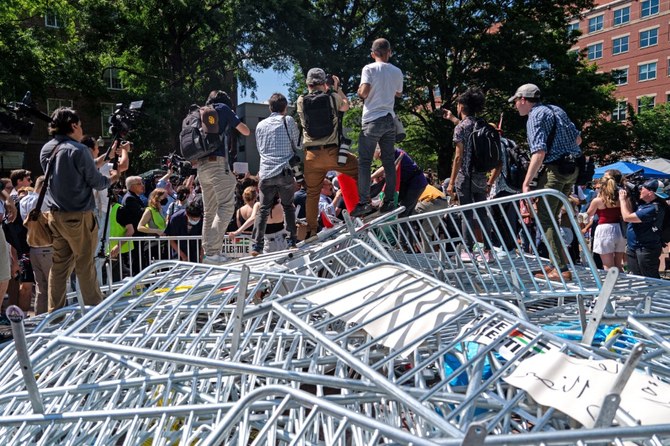
- Journalists said they have been barred from reporting on events
LONDON: Media watchdog Committee to Protect Journalists has called on authorities to allow journalists covering US college protests to do so “freely and safely.”
“Journalists — including student journalists who have been thrust into a national spotlight to cover stories in their communities — must be allowed to cover campus protests without fearing for their safety,” said Katherine Jacobsen, the CPJ’s US, Canada and Caribbean program coordinator.
“Any efforts by authorities to stop them doing their jobs have far-reaching repercussions on the public’s ability to be informed about current events.”
Tensions have escalated between pro-Palestinian demonstrators and law enforcement during recent protests at universities across the US.
On Tuesday night, New York police equipped with anti-riot gear forcibly entered Columbia University’s Hamilton Hall, a focal point of the protests, resulting in the arrest of approximately 300 pro-Palestinian students.
Meanwhile, student journalists at the University of California in Los Angeles reported being assaulted and exposed to gas during violent clashes. In Northern California, local journalists covering college demonstrations were detained and arrested by police.
The CPJ said at least 13 journalists had been arrested or detained since the start of the Israel-Hamas war on Oct. 7 and 11 have been assaulted while covering related protests in the US.
Those arrested include FOX 7 reporter Carlos Sanchez, who was shoved to the ground last month while covering a protest at the University of Texas in Austin. He is currently facing two misdemeanor charges.
Universal Music Group artists to return to TikTok after new licensing pact

- New deal to restore label’s song to platform, increase artists’ protection from AI
- Universal Music says TikTok accounts for 1 percent of its annual revenue in 2023
LONDON: Universal Music Group and TikTok said on Thursday they had reached a new licensing agreement that will restore the label’s songs and artists to the social media platform as well as give musicians more protections from artificial intelligence.
TikTok began removing Universal’s content from its app after their licensing deal expired in January and the two sides failed to reach agreement on royalties, AI and online safety for TikTok’s users.
Describing their new pact as a multi-dimensional deal, the companies said they were working “expeditiously” to return music by the label’s artists to TikTok, and also said they would team up to realize new monetization opportunities from TikTok’s growing e-commerce capabilities.
They will “work together on campaigns supporting UMG’s artists across genres and territories globally,” the two firms said in a joint statement.
The short video app is a valuable marketing and promotional tool for the music industry. TikTok is where 16- to 19-year-olds in the United States most commonly discover music, ahead of YouTube and music streaming services such as Spotify , according to Midia Research.
“Roughly a quarter of US consumers say they listen to songs they have heard on TikTok,” said Tatiana Cirisano, Midia’s senior music industry analyst.
However, Universal Music claimed its artists and songwriters are paid just a fraction of what it receives from other major social media platforms.
The music label says TikTok accounts for 1 percent of its annual revenue or about $110 million in 2023. YouTube, by contrast, paid the music industry $1.8 billion from user-generated content in the 12 months ending in June 2022, according to Midia.
In a move that may well have eroded its bargaining power, Taylor Swift, one of Universal Music’s biggest acts, allowed a selection of her songs to return to TikTok as she promoted her latest album, “The Tortured Poets Department.”
Swift owns the copyrights to her recordings through her 2018 deal with Universal and can control where her songs are available, according to the Financial Times.
As licensing negotiations resumed in recent weeks, AI remained a major point of contention. Universal has claimed TikTok is “flooded” with AI-generated recordings, including songs that users create with the help of TikTok’s AI songwriting tools.
In Thursday’s deal, TikTok and Universal said that they would work together to ensure AI development across the music industry will protect human artistry and the economics that flow to those artists and songwriters.
“TikTok is also committed to working with UMG to remove unauthorized AI-generated music from the platform, as well as (developing) tools to improve artist and songwriter attribution,” the statement said.
Concerns about AI have grown in the creative community. In April, a non-profit group called the Artist Rights Alliance published an open letter urging the responsible use of the technology. The group of more than 200 musicians and songwriters called on technology companies and digital music services to pledge not to deploy AI in a way that would “undermine or replace the human artistry of songwriters and artists or deny us fair compensation for our work.”
The deal comes amid questions over TikTok’s long-term future in the United States. President Joe Biden signed legislation last week that gives TikTok’s Chinese owner, ByteDance, 270 days to sell its US assets. TikTok has vowed to file suit to challenge the legislation, which it calls a ban.
More than 170 million Americans use its video service, according to TikTok. Globally, it has more than 1.5 billion monthly active users, according to research firm Statista.
Comedian Stephen Colbert defends pro-Palestine college campus demonstrators after Trump attack
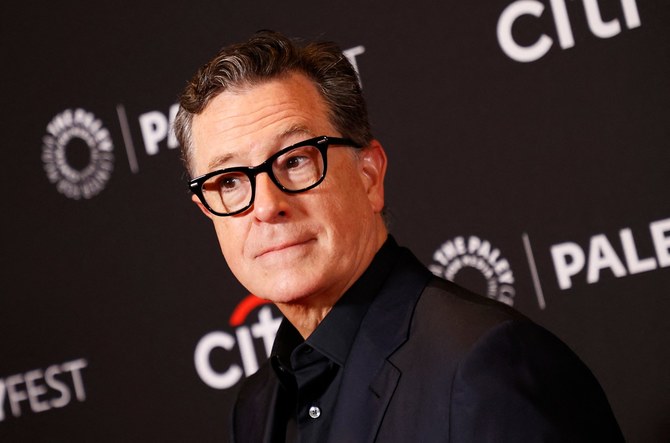
- Comedian said protests should be allowed to continue as long as they are peaceful
- Trump claimed 2017 white nationalist rally in Charlottesville was ‘nothing’ in comparison to pro-Palestine college protests
LONDON: American comedian Stephen Colbert has defended pro-Palestinian college campus demonstrators, countering recent criticism from former President Donald Trump.
Last week, Trump likened the student rallies to the 2017 white nationalist rally in Charlottesville, Virginia, claiming the latter was “nothing” in comparison.
On his “Late Show” segment, Colbert expressed solidarity with the protestors who are urging their institutions to cut ties with companies profiting from the conflict in Gaza.
The host said that peaceful protests “should be allowed,” rebuking Trump for “downplaying one of the darkest chapters in American history.”
He added: “Now even if you don’t agree with the subject of their protests, as long as they are peaceful, students should be allowed to protest. It’s their First Amendment right.”
The former “The Colbert Report” star criticized the response of both university officials and law enforcement to recent events at Columbia University, denouncing the use of heavily armed police and threats to call in the National Guard as a “classic de-escalation tactic.”
Trump, however, praised law enforcement’s handling of the situation, commending New York City’s police force.
Colbert’s remarks coincided with the deployment of riot police at Columbia University’s Hamilton Hall, resulting in the arrest of numerous pro-Palestinian students who had occupied the building.
The raids drew condemnation from advocacy groups such as Jewish Voice for Peace and UN Special Rapporteur Francesca Albanese. New York City’s mayor reported the arrest of 282 students.
Subsequent clashes between pro-Palestinian groups, counter-protestors, and law enforcement erupted at other campuses across the US.
Meanwhile, Brown University in Rhode Island reached an agreement with protesters on Tuesday, marking what appears to be the first time a US college has agreed to vote on divestment in response to the protests.
Like Digital & Partners opens new office in Saudi Arabia

- Digital transformation agency expands with Riyadh premises
DUBAI: Like Digital & Partners, an independent digital transformation agency with offices in Dubai and London, has announced the opening of premises in Riyadh to mark its expansion into the Kingdom.
The move comes a month after the agency partnered with business expansion platform AstroLabs to extend its footprint in the region.
The new office in Riyadh will underscore its commitment to the region, it said in a statement.
Like Digital & Partners aims to create new jobs primarily in the fields of project management and user interface design. It plans to employ 10 to 15 staff members at its Riyadh office by the end of 2025.
Specializing in the hospitality industry, the agency has worked with resorts such as Atlantis and One&Only One Za’abeel. It aims to leverage this expertise and experience in the Kingdom, which is seeing an influx of new hotels and resorts, the agency said.
Karl Escritt, CEO of Like Digital & Partners, said: “As we continue our rapid expansion into the GCC (Gulf Cooperation Council) market and beyond, we are delighted to lay down roots in Riyadh, Saudi Arabia.
“Having dedicated years to nurturing our business in the Kingdom and developing our knowledge and expertise of the market, we are looking forward to further strengthening our ties and servicing new clients.”
Publicis Sapient appoints new managing director for Saudi Arabia

- Ashwaq Al-Shathri will be based in Riyadh, oversee company’s business growth in the Kingdom
DUBAI: Publicis Sapient, a digital business transformation company, has announced the appointment of Ashwaq Al-Shathri as country managing director for Saudi Arabia.
The appointment reflects the importance of the Kingdom and the Middle East for Publicis Sapient, the company said.
 Based in the company’s Riyadh office, Al-Shathri will be responsible for accelerating business growth in Saudi Arabia and building the operational business and community.
Based in the company’s Riyadh office, Al-Shathri will be responsible for accelerating business growth in Saudi Arabia and building the operational business and community.
She will lead the teams responsible for digital business transformation in the region, leveraging the company’s strategy, product, experience, engineering and data, and artificial intelligence capabilities.
Nigel Vaz, CEO of Publicis Sapient, said: “We’re committed to supporting KSA’s technology-driven transformation and realization of Vision 2030, while also, ultimately, helping position KSA as a leader in digital innovation on the global stage.”
Al-Shathri’s appointment “will directly contribute to our continued business growth as we scale our expertise in the Middle East to better serve our clients and their customers and help them transform digitally,” said Srinivas Devulapalli, managing director of Publicis Sapient MENA (Middle East and North Africa).
Publicis Sapient is the digital business transformation hub of Publicis Groupe with 20,000 people and over 53 offices worldwide. Its global clients include Marriott, Goldman Sachs, McDonald’s, and Walmart, while regional clients include Omantel, Diriyah Gate, and Miral.



